How to Support Your LGBTQIA Friends and Family

It is the month of June and all that I can think of are rainbows, colors, unicorns, and pride march. After all, June is marked as Pride Month. Thank you to the work of Brenda Howard the “Mother of Pride.” She was instrumental in organizing the first-ever Pride March in the year 1970. Ever since then it has been a much-awaited time of the year for the LGBTQ community and its supporters (including me).
Generally, when we talk of being supportive of our LGBTQ loved one, we might assume that putting up a story on social media, sharing a post, or painting the walls colorful is all we are referring to. But support is beyond taking part in these activities, it is also about being aware, showing acceptance, and showering love.
While these words might sound familiar, having an action plan ready to put them to work is sure to help. So this pride month we are sharing with you a complete guide on How to support LGBTQ youth, a friend, or a loved one.
Guide Me: How To Support LGBTQ Friend
Stay Informed
The first step towards supporting your LGBTQIA+ buddy or family member is to clear your head first. Dr. Richie Gupta, an expert in sex-change surgery suggests that “You need to confront your own prejudices and biases, even if it is uncomfortable for you to do so.”
Educate yourself, question your biases, take your time to learn about the spectrum of sexualities, understand the underlying pain that a derogatory remark may cause, and be open and non-judgemental. Be ready to accept the fact that in this process you might make some mistakes but at the same time learn from them and use them to support your loved ones. Plus, if you hear someone else making any assumption or remark on the LGBTQIA+ community, never miss a chance of challenging them. After all, awareness increases with communication.
Remember, LGBTQ is an umbrella term that considers different equalities under it. Interestingly each day of the month is dedicated to one form of sexuality. Check the calendar below to know more about it.
Respect Their Identity
Ok, take a deep breath! You have to be cautious but not overly concerned with how you can be there for your LGBTQ friend. By being too concerned you may hamper the bond that you share with them.
No matter what their sexual orientation is it should not impact your relationship with them, if that happens it clearly works as a red signal. Make sure that you don’t send any! In fact, give them a sense of inclusiveness to enjoy where you are not discriminating between them and your straight friends.
You don’t have to stand up with a placard reading “I support my LGBTQ friends” to show that you respect them. Just treating them as friends, not as someone different, irrespective of whatever they chose to be, the pronoun they want to be addressed with, is how you respect them. Don’t forget that friendship is more about understanding the language of love than focusing on sexual identity.

Understanding the Meaning of LGBTQIA++ Flag
Be Their Ally
Ally? Yes, be an ally to LGBT people in your life. Just like when you are new to a school you get a buddy to support you. Similarly, you can be a buddy or an ally to someone who is discovering their sexuality.
An ally is a person who is genuine and is concerned for the well-being of LGBTQ people. The support also includes advocating for equal rights and confronting the challenges that they experience. Here are some points to keep in mind to be an LGBTQ ally:
- Do not “out” them without their permission. Speak openly about them in front of friends and colleagues only if they are comfortable with the same.
- Stand up against discrimination and inequality. If you see someone using hurtful language or offensive terms, learn how you can defend them.
- Know the words that hurt. Your language and vocabulary impact a person at both mental and emotional levels. Make sure that you don’t use words that carry painful undertones for your loved one.
- Find support for yourself. Being a good ally also includes having support networks of your own. It will help you gain perspective and understand the experience of other community members.
- Listen, ask, and adapt. This is perhaps one of the most important factors related to being an ally of an LGBTQ individual. Let the person you are an ally of guide you, let them speak and share. Talking over them or making assumptions is likely to hold you back
Rock Your Pride
We know at the beginning of this blog we discussed that it is not ONLy about participating in the events. But hey, we didn’t mention that you shouldn’t be doing it. Bring out your colors, wear that rainbow-colored t-shirt, and pull up your unicorn socks! It is PRIDE MONTH. Let us celebrate it. Plus, your participation in the same will make your LGBTQIA buddy feel accepted and inclusive.

Encourage them to Seek Professional Help
Do you know that one of the key elements that you need to work on to say that you support LGBTQIA+ is by making mental health resources accessible to them? Getting professional support helps them work on their past trauma and make their present filled with happy times. You can encourage them to seek help from a professional if they are experiencing sadness, anxiety, or stress in their life. In fact, as an ally, you may even accompany them to their appointments.
To learn more about pride mental health resources and how you can support them in accessing the same, please refer to our blogs shared below.
Useful Mental Health Resources for LGBTQIA+ Community
We hope that this Pride Month you will make a difference in someone’s life by either being an LGBTQ ally at work or by joining the celebration on the streets. Just make sure that you give them a sense of community, belongingness, and love.
Now go celebrate love not just today or for this month but each day of our lives. After all, awareness and support is not a one-month parade but an ongoing process, don’t pause it, keep it going! Your little changes can bring a big difference.
#CelebratePride #LoveIsLove
P.S.: While you are being an ally, don’t forget to take care of yourself.
Thank you for reading.
Love & light!
Other Useful Information
What Is LGBTQ Therapy And How It Works In LGBTQ Issues?





















